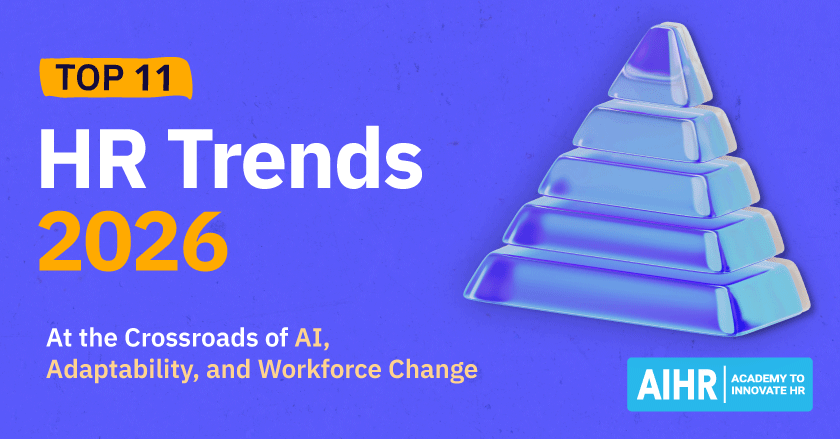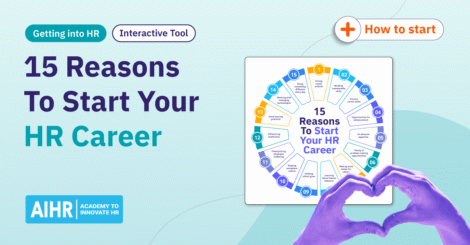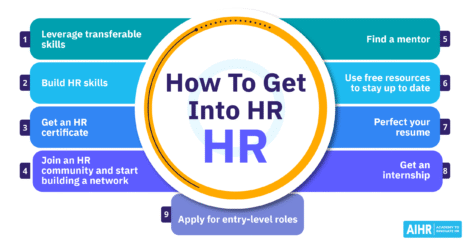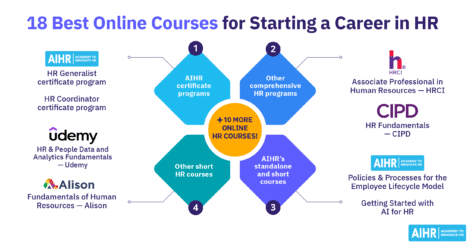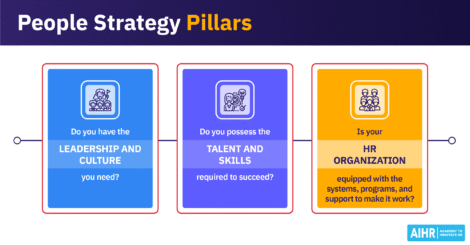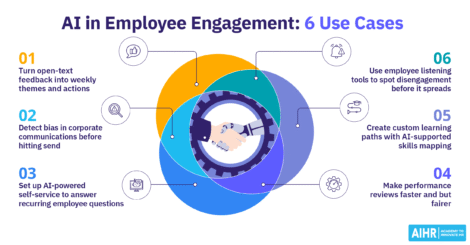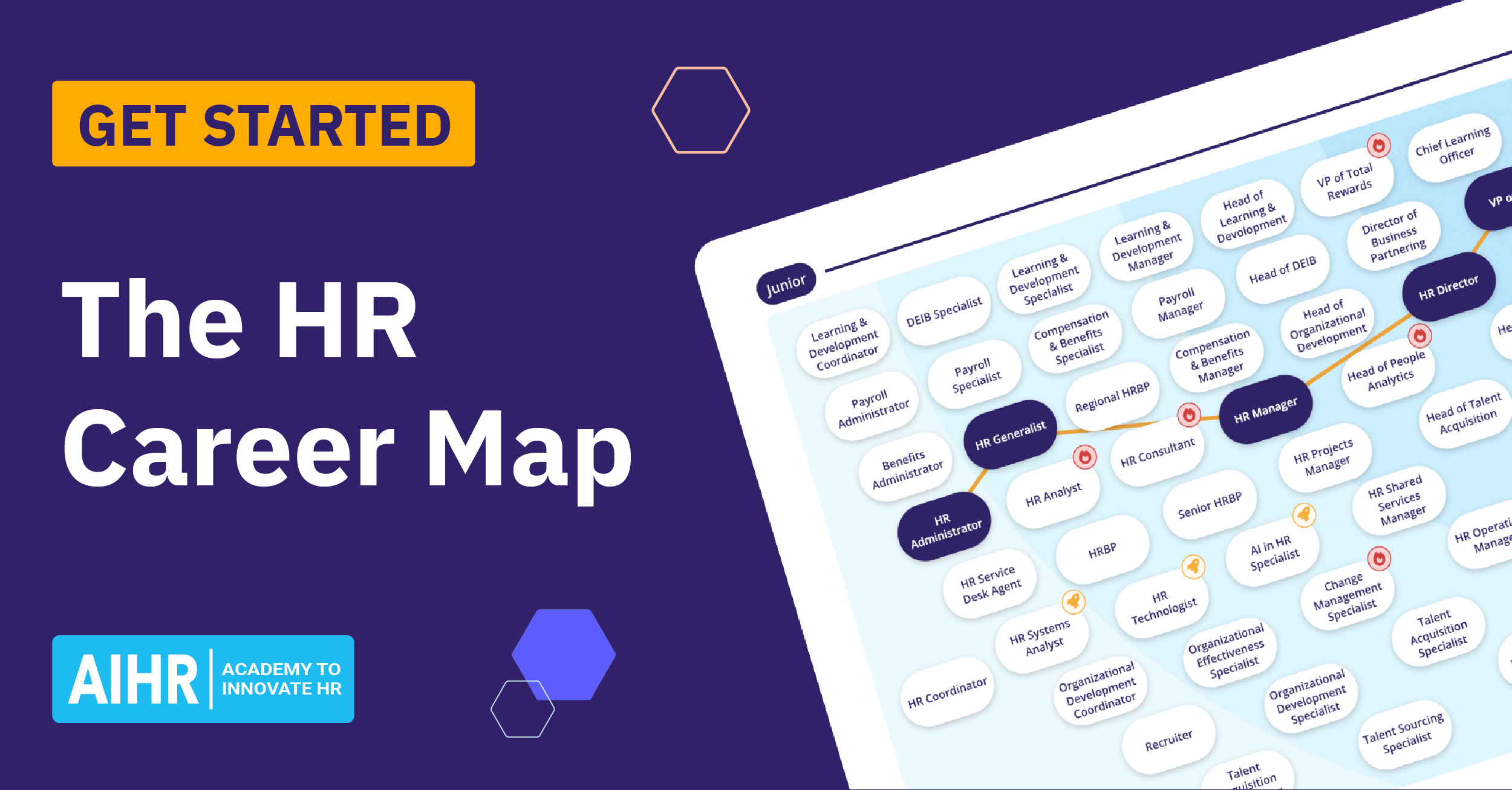Is HR a good career for you? AIHR’s Subject Matter Expert, Dr Marna van Der Merwe, candidly answers this burning question: “HR is a great career if you believe people practices are core to sustainable business success. There’s so much room to make an impact, and the profession requires passionate and skilled professionals to do so.”
So, if you’re looking to make an impact on people and organizations, read on to understand why HR might be a great career choice for you.
Contents
Why work in HR?
Why is HR a good career?
What does HR do?
What are the different types of HR careers?
Does HR pay well?
What are the pros and cons of a career in HR?
Is HR right for me?
Is a degree in human resources worth it?
How can I start a career in HR?
What is the future of HR?
FAQ
Why work in HR?
Let’s start with a fundamental question: Why go into Human Resources? An often-heard answer is, “Because I love working with people.” However, this is an oversimplification of what an HR career can offer.
Choosing a career in HR means:
- Making a tangible impact: Dr Marna van der Merwe, HR Subject Matter Expert at AIHR, says, “If you want to make an impact on business and people, HR is one of the most rewarding jobs. It doesn’t matter where you work in HR; there’s a human being at the end of every HR process and practice. Collectively, what you do makes an impact on the sustainability of the business.”
- Offering diverse career opportunities: HR offers various career opportunities, from recruitment and talent management to employee relations and compliance. This allows you to find a niche that best fits your strengths, making it easier to build a fulfilling career.
- Providing career advancement and job stability: HR professionals have many opportunities for career advancement. From entry-level positions, you can grow into roles like HR Manager and Chief Human Resources Officer (CHRO).
Why is HR a good career?
Depending on the specific role, HR requires a wide range of skills and competencies, making it an exciting field to work in. These include data literacy, digital agility, business acumen, people advocacy, and execution excellence.
At the same time, there is a rising demand for skilled HR professionals. According to the U.S. Bureau of Labor Statistics, the demand for HR Specialists is set to increase by 6% between 2022 and 2032 — faster than average compared to all other occupations.
HR’s role as a strategic partner in business operations has also grown.“Working in HR is a tough gig, but one I would choose every time. You’re one of the few professions that impact the lives of individuals, have the opportunity to influence leaders, improve organizations, and work to make a social impact,” Dr. Dieter Veldsman, Chief Scientist at AIHR, explains.
HR is also constantly evolving due to the advent of new technologies and changing legal standards. This creates a need and an opportunity for HR professionals to pursue ongoing education and certification, which can enhance their skill sets and career prospects.
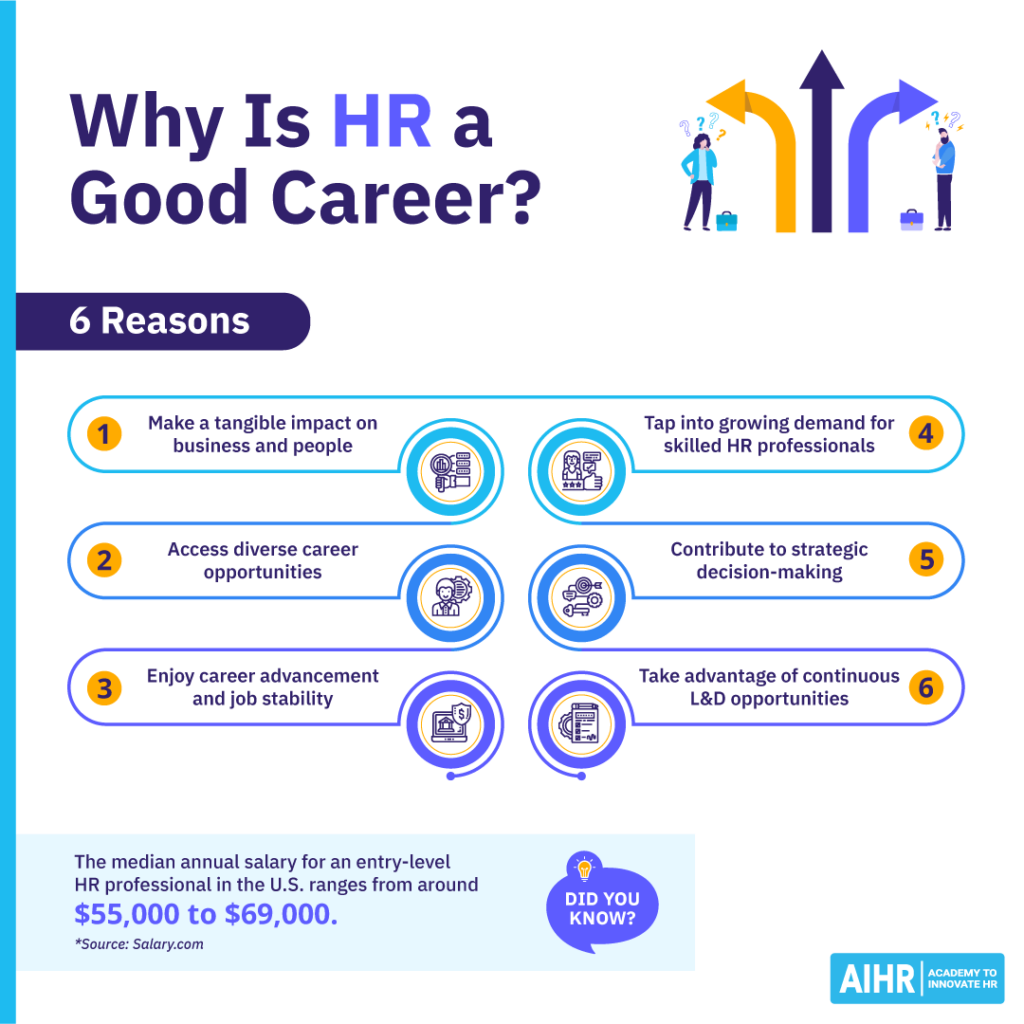
What does HR do?
HR fulfills multiple functions in an organization. The following 12 key functions of human resources will give you an idea of this multifaceted profession.
- Human resource planning: HRP is a continuous, data-driven process that enables an organization to plan for the future. This means ensuring the right people are in the right place at the right time to help achieve its strategic goals.
- Recruitment and selection: This HR function is about attracting and hiring the best candidates who suit the company culture and will help the business achieve its achieve objectives.
- Performance management: Managing employee performance is essential for employees to stay engaged and productive, as it ensures they are clear on their goals and how to achieve them. Performance management also provides employees with regular feedback and holds them accountable for their work.
- Learning and development (L&D) is an essential HR responsibility. It involves enabling employees to develop and master the skills and competencies they (and the organization) need for the future.
- Career planning: This function is about showing employees how they can align their ambitions with the organization’s future. This can give them a greater sense of professional purpose and encourage them to remain at the company.
- Function evaluation: This is a technical aspect of HR that compares different HR operations. It is based on the idea that similar rewards should be given for similar jobs. These HR operations can include worker availability and quality, job responsibilities, and economic factors.
- Rewards: This function is essential to maintaining employee engagement and satisfaction. Rewards include recognition, a good work-life balance, growth and career opportunities, and monetary and non-monetary awards (such as bonuses and gifts).
- Industrial relations: Industrial relations refers to HR’s efforts to cultivate and maintain relationships with collectives (like labor unions) and their members.
- Employee participation and communication: HR practitioners are sometimes also called people advocates. This means they keep employees informed on important business matters and listen to their concerns and complaints.
- Health and safety: HR is responsible for creating, implementing, and maintaining health and safety regulations to ensure a safe work environment for employees
- Employee wellbeing: Employee wellbeing has become an essential HR function, leading to wellness programs promoting physical, mental, and financial well-being.
- Administrative responsibilities: One of HR’s most traditional functions is administration, which can include personnel-related procedures and digital technologies like a Human Resources Information System (HRIS).
What are the different types of HR careers?
So, what would a career in HR look like? That depends on your starting point, the size and location of the company, your personal career aspirations, and your skills and competencies. Here are a few examples of the various roles in HR and what they entail.
Entry-level HR roles
There are a few entry-level positions you can consider when you’re just starting out in HR. Some examples include:
1. HR Coordinator
An HR Coordinator supports various HR functions, including recruitment, onboarding, employee relations, and benefits administration. They act as liaisons between HR managers and employees and often handle administrative duties, such as maintaining employee records and coordinating training sessions.
2. Talent Acquisition Specialist
A Talent Acquisition Specialist’s job is to identify, attract, and hire top talent. They also develop recruitment strategies, conduct interviews, and onboard new hires. They often manage the entire hiring lifecycle, from sourcing candidates to negotiating job offers.
3. Recruiting Coordinator
A Recruiting Coordinator is responsible for managing and streamlining the recruitment process. They schedule interviews, coordinate between candidates and hiring teams, maintain candidate databases, and ensure a positive candidate experience. They also handle administrative tasks related to hiring, such as background checks and offer letters, and may assist in sourcing candidates.
Certificate programs to take
- People Analytics Certificate Program: Develop a full analytics skill set & drive data-driven HR.
- HR Data Analyst Online Course: As part of the People Analytics Certificate Program, you’ll learn how to analyze, summarize, and visualize HR data in Excel.
Mid-level HR roles
Next, there are mid-level HR roles you can progress into from entry-level positions with the right career trajectory, experience, and qualifications. Here are some examples:
4. HR Business Partner
An HR Business Partner plays a key role in connecting HR with the business side of an organization to help it achieve its goals. HRBPs work closely with line managers to set priorities and ensure HR activities align with their needs.
5. Compensation Analyst
A Compensation Analyst is responsible for managing and analyzing an organization’s compensation structure to ensure fair and competitive pay practices. They conduct salary surveys, evaluate job positions, and recommend pay scale adjustments based on market trends, employee performance, and budget constraints.
6. HR Manager
An HR Manager oversees and manages the HR department, ensuring effective HR strategy and policy implementation. This includes responsibilities like recruitment, employee development, performance management, and compliance with labor laws. HR Managers also play a crucial role in shaping company culture, addressing employee concerns, and contributing to organizational development.
Senior HR roles
Finally, there are senior HR roles, which involve strategic leadership, overseeing talent management, organizational development, and aligning HR practices with business goals. They require extensive HR experience, advanced knowledge of labor laws and HR practices, and, often, further education or certifications in HR management. Some examples are:
7. Chief Human Resources Officer
A Chief Human Resoures Officer (CHRO) is responsible for overseeing all aspects of an organization’s HR operations. This includes developing HR strategies aligned with company goals, managing talent acquisition, employee relations, performance management, and ensuring compliance with labor laws. The CHRO also plays a critical role in fostering employee engagement and leadership development.
8. Global HR Manager
A Global HR Manager leads the organization’s international HR processes and ensures consistency and legal compliance across different geographical locations. This role involves managing international talent acquisition, employee relations, and fostering cross-cultural collaboration. At the same time, they must help maintain the company’s competitive edge in various markets.
HR tip
Gemma Baldock, in-house leadership coach at AIHR, advises: “Carefully research all the roles and see which one best fits your strengths, because they all require different things. Also, think about what it’s like to do HR in different types of companies. Doing HR in a scale-up where you’re more of a generalist is very different from doing HR in a large corporation, where you will more likely specialize.”
Does HR pay well?
The answer to this question depends on several factors. First, the definition of ‘well paid’ is typically subjective, differing based on individual perspectives. Second, your experience, education, and skills, as well as the industry, company size, and location, will all influence your salary.
According to Salary.com, the average annual base pay for an entry-level HR position in the U.S. is $62,800, while a CHRO would earn approximately $350,400 on average per year.
What are the pros and cons of a career in HR?
Like any other profession, working in HR has its advantages and disadvantages. Here are a few pros and cons, according to AIHR’s People Team and SMEs (Subject Matter Experts).
HR offers plenty of opportunities to make a significant impact on both people and businesses.
Balancing employee and organizational needs while ensuring legal compliance is a difficult task. You may find it intense and overwhelming.
Depending on your personal preferences, there’s many HR roles to choose from.
Many outside HR do not understand the HR’s functions and purposes well. In fact, HR professionals sometimes describe their jobs as ‘thankless’.
Working in HR is never dull. It can be highly challenging and often allows you to test and sharpen your problem-solving skills.
Mediating employee conflicts, addressing performance issues, or handling disciplinary actions can be stressful and emotionally draining.
Working in HR, especially as a Recruiter, can be fulfilling as you match individuals with suitable roles and watch them thrive at work.
You may need to deal with sensitive issues like layoffs, terminations, or employee grievances. This can be emotionally taxing, especially if they involve people you’ve built relationships with.
HR management job outlook
Let’s examine the outlook for HR, in-demand skills, and global opportunities:
- Positive growth: According to the U.S. Bureau of Labor and Statistics, the HR job outlook is positive. With a predicted 10% industry growth rate between 2020 and 2030, aspiring HR professionals will have plenty of opportunities.
- In-demand skills: The core HR competencies HR practitioners require to excel include business acumen, data literacy, digital agility, people advocacy, and execution excellence. Developing these competencies can make you a valuable asset to any organization.
- Global opportunities: Organizations worldwide need HR professionals. This global demand offers opportunities for those interested in becoming HR professionals in their home country and those aiming to work abroad or with international teams.
“HR is a great career if you believe people practices are core to sustainable business success. There is so much room to make an impact, and the profession requires passionate and skilled professionals to do so.”

Is HR right for me?
To help you assess whether a career in HR is the right choice for you, we’ve created a checklist with questions you can ask yourself.
Interest and passion
✔ Do you enjoy problem-solving and conflict resolution?
✔ Do you want to help organizations succeed by enabling their people to thrive?
✔ Are you passionate about fostering a positive and inclusive work environment?
Personal attributes
✔ Are you an active listener and a good communicator?
✔ Do you have strong interpersonal skills?
✔ Are you detail-oriented and able to handle multiple tasks at once?
✔ Can you manage your emotions and understand the feelings of others effectively?
Skills and abilities
✔ Are you capable of maintaining confidentiality and handling sensitive information?
✔ Do you understand basic business principles, and can you see how HR contributes to the overall business strategy?
✔ Are you comfortable using new technology and excited about learning to work with HR tools and software?
✔ Do you understand the importance of data in decision-making, and are you interested in learning about (and analyzing) HR metrics?
Continuous learning and development
✔ Are you committed to ongoing professional development and learning?
✔ Are you interested in pursuing one or more HR certifications of your choice?
Reflect on your answers to the above questions to identify areas where you feel confident and areas where you may need development. If you have questions about any of these areas, reach out to current HR professionals or mentors for answers or advice.
Is a degree in human resources worth it?
We gathered some expert perspectives from AIHR to help you decide:
“Any formal HR qualification provides a great knowledge base and the foundations of being a skilled HR professional. Having a qualification can also create a sense of competence for HR professionals, who will feel more prepared for the role.”

“I don’t have a degree in HR; my background is in Business Administration. I’ve found a broader business education to be extremely valuable, especially in a general HR or recruitment role. However, combining a business background with specialized HR courses can provide a strong foundation and enhance business acumen for HR professionals.”

“At the pace of change we are experiencing, it’s important to build a career that is adaptive to change, built on transferable skills and continuous learning through various career experiences and exposure. It also requires an openness to learn from other disciplines and build skills outside of the core HR skillset (like digital, data, design thinking, branding, etc.).”

How to start a career in HR
How you start a career in HR largely depends on your short- and long-term professional goals. Here are a few ways you can embark on your HR journey:
Step 1: Reach out to an HR professional
You could reach out to someone who already works in HR, ideally in the role you want to pursue. You could also speak to someone on your company’s People Team or contact someone in your (online) network.
Many, if not most, people are happy to help someone, especially if it is by simply talking about what they do for a living and sharing their experience.
Step 2: Use our AIHR career map
If you want to learn more about different HR roles, skills, and competencies required for specific jobs, salary ranges, and career opportunities, check out AIHR’s HR Career Map. It will give you a realistic and detailed picture of what to expect.
Step 3: Consider obtaining an HR qualification
While a degree in Human Resources may be necessary for some, others may prefer to learn on the job and attend specialized courses like AIHR’s certificate programs. Such courses cost much less than a degree, and the certifications they offer will help you in your HR career.
Step 4: Join an HR community
Joining an HR community is a great way to learn how to start your HR career from HR professionals and stay updated on suitable job vacancies. Examples of great HR communities to join are:
- Our AIHR student community
- The Evil HR Lady Facebook Group
- Hacking HR
- HR Ninjas.
HR tip
Dr Dieter Veldsman says, “I think a degree in HR gives you a robust background across the value chain. It helps you understand how human behavior and organizations work while providing deeper technical expertise in some domains. I think a degree without experience, however, is not very valuable. As such, I would encourage any aspiring HR professional to combine both in their professional development.”
What is the future of HR?
Another consideration you should take into account while contemplating whether HR is a good career choice is what the future of the profession may look like.
AIHR has identified four megatrends we believe will significantly impact economies, organizations, and individuals over the next decade and redefine HR. They are:
- The changing composition of the labor market: This will challenge HR in finding and retaining the right talent and skills companies need to succeed.
- Resource scarcity affecting organizational effectiveness: Organizations worldwide will compete for scarce resources and skills, which will influence the availability of talent in certain industries and markets.
- Technological developments impacting future work design: As AI continues becoming more prevalent, job redesign, staying updated on tech developments, and navigating this transition will be a top priority for HR.
- A changing relationship with work and employment: People’s expectations of their employers have changed, especially post-COVID. This means HR must refine its employer value proposition (EVP) and operational approaches.
This means HR professionals must focus on four target audiences: employees, leaders, stakeholders, and society. Additionally, HR must change how it operates by concentrating on four key capabilities: strategic impact, omnichannel engagement, products and solutions, and HR tech and data capability.
For an in-depth analysis and explanation of the possible future of HR, check out our article, Breaking the Old HR Mold: It’s Time to Redefine HR.
To sum up
HR professionals play a crucial role in workplace culture, talent management, and ensuring legal compliance. For those who thrive in roles dependent on strong communication, problem-solving, and interpersonal skills, HR offers plenty of opportunities.
However, a career in HR also requires empathy and pragmatism, as HR professionals often must make difficult decisions that affect others’ careers and lives. The work can be demanding, with responsibilities ranging from conflict resolution to managing complex organizational changes.
Additionally, HR must get used to continuous learning and adaptation to new technologies, legal requirements, and best practices. If you enjoy continuous professional development and want to make a tangible impact on both individuals and organizations, HR could be an excellent career choice.
FAQ
This depends on what you are looking for. If you want to make a business impact and help the people in an organization thrive, a career in HR might be for you. But beyond that, you should consider which HR role is right for you as the profession is multifaceted and complex.
Again, this depends on your professional goals. However, in terms of job outlook, opportunities for advancement, and exciting challenges, HR typically delivers in all three aspects.
HR does have a good future, considering that demand for HR professionals is on the rise. There are opportunities worldwide — you just have to determine which industry, location, and HR role you want to be in before you make a decision on where to go.
Getting an HR degree can give you a basic understanding of the field and profession. However, it is not always a necessity. Even without an HR degree, you can still access opportunities to work in HR.


